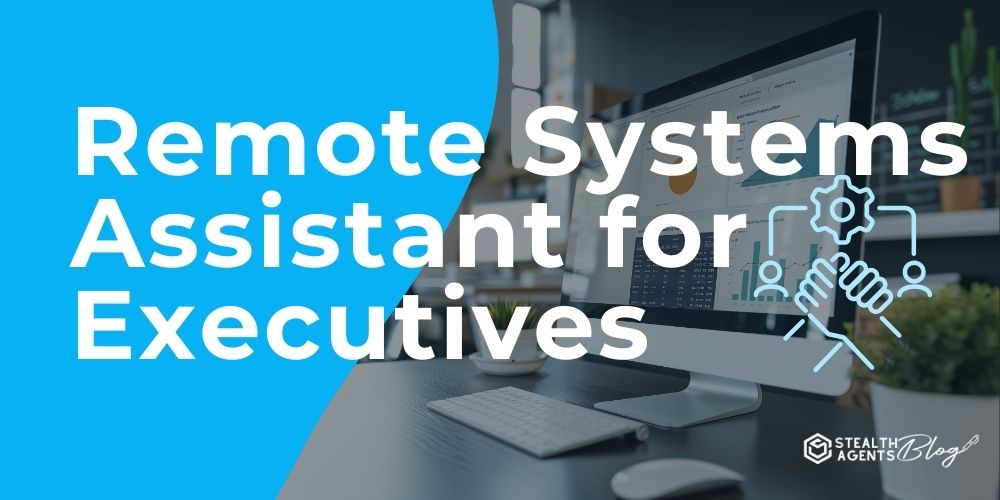Many industries are now relying more on digital tools and remote work, which means they need good support systems.
Over half of businesses are working remotely, making the job of remote system assistants very important for smooth operations.
These experts fix and manage system problems, which is necessary since 70% of remote workers face tech issues.
Stealth Agents provides support services, allowing businesses to hire virtual assistant to help with these problems.
Their virtual assistant pricing is $15 per hour, making it affordable for all businesses.
There’s a growing need for this support as companies want to boost productivity and reduce interruptions.
With the digital world changing, remote system assistants play a key role in keeping things running smoothly.
What Are Remote Systems?
Remote systems are tech setups that let you run, control, and watch over tasks from afar without being there in person.
They make things more flexible and efficient by letting people and businesses access information and handle tasks remotely.
Industries like healthcare, finance, and manufacturing use remote systems to gather, analyze, and make decisions based on real-time data. They help teams work well together no matter where they are.
Hire assistants because they make sure these systems are secure and run smoothly. Remote systems are key to digital change, and they use tools like cloud computing and IoT.
Their use helps organizations cut costs, boost productivity, and keep operations running.
To make these systems even better, companies can hire virtual assistants from 15 companies in the Philippines, known for their skill in managing tech across different sectors.
Who Are Remote Systems Assistant Executives?
Assistant executives are in charge of managing remote systems to make sure they work well.
You can hire remote workers Philippines to help run these systems more efficiently.
These professionals work closely with different departments to fit remote systems smoothly into current operations.
They check how systems are working, fix problems, and update them to improve performance.
Part of their job is also to keep systems secure by setting up rules and protecting data from unauthorized access.
Remote assistants need to have strong analytical skills and be good with technology to handle complex software and hardware.
They often team up with remote staff Philippines to plan strategies that match company goals and boost efficiency. They also need to keep up with the latest tech developments to stay competitive.
What Are The Tasks of Remote Systems Assistant Executives Provide?
1. System Monitoring
Assistant executives continuously oversee remote systems, ensuring every aspect functions correctly and efficiently.
They utilize advanced monitoring tools to track system performance, quickly identifying anomalies or irregularities.
By maintaining constant vigilance, they can address potential issues before they escalate, minimizing downtime and ensuring smooth operations.
Regular reports generated from monitoring activities offer insights into system health, helping virtual assistants make informed decisions.
They also adjust system settings to maintain optimal performance, adapting to changing demands or workloads.
This proactive approach allows businesses to focus on core activities, confident that their systems are in capable hands. The peace of mind with reliable system monitoring is invaluable, especially in today’s fast-paced business environment.
2. Troubleshooting and Support
Providing timely resolution of technical issues is a key service offered by remote systems assistant executives, minimizing disruptions to business operations.
They are equipped to handle various technical challenges, from hardware malfunctions to software glitches.
Their expertise enables them to quickly diagnose problems and implement effective solutions, ensuring minimal impact on productivity.
Assistant executives communicate openly with clients, providing updates and explanations of any issues.
They also offer guidance to prevent future occurrences, educating staff on best practices for system use.
Their support extends beyond immediate fixes, aiming to build long-term resilience within the system framework.
By handling technical problems efficiently, these executives help businesses maintain stability and focus on their strategic goals.
3. Security Management
Implementing and maintaining security protocols is a crucial responsibility of assistant executives, who prioritize safeguarding data and systems.
They start by conducting thorough assessments to identify potential vulnerabilities and areas of risk.
Based on these evaluations, they develop comprehensive security strategies that include encryption, firewalls, and access controls.
Regular updates and patches protect systems against emerging threats and vulnerabilities.
The remote assistant work monitors suspicious activity and is ready to respond swiftly to potential breaches.
They continuously learn to stay abreast of the latest cybersecurity trends and technologies, ensuring their methods remain effective.
Implementing robust security measures helps businesses protect sensitive information and maintain client trust.
4. System Upgrades
Another critical service assistant executives offer is managing updates and enhancements, ensuring systems remain current with technological advancements.
They evaluate the existing technology landscape within the organization to identify areas that could benefit from upgrades.
By planning and executing updates, they improve system functionality and performance, addressing any compatibility issues that arise.
These executives coordinate with vendors and stakeholders to ensure a smooth transition during upgrades, minimizing disruptions to daily operations.
They also provide staff with training and support, helping them adapt to new features and capabilities.
Regularly scheduled upgrades prevent systems from becoming obsolete, maintaining competitiveness in the fast-evolving tech world.
Through careful management of system upgrades, assistant executives keep businesses poised for future growth and success.
5. Consultation and Strategy Development
Remote systems assistant executives work closely with businesses to develop plans that align with organizational goals and improve remote system performance.
They begin by conducting a thorough analysis of current systems and processes to understand the company’s unique needs and objectives.
Based on their findings, they propose strategies that address specific challenges and leverage opportunities for improvement.
These executives collaborate with decision-makers to refine and implement the strategies, ensuring alignment with the broader business vision. As trusted advisors, they provide ongoing consultation, offering insights and recommendations as the business landscape evolves.
Their expertise helps businesses navigate technological advancements, positioning them for success in a competitive market.
Organizations can achieve their objectives and drive sustainable growth by aligning technology strategies with business goals.
How Do Remote Systems Assistant Executives Ensure Data Security?
Assistant executives ensure data security by implementing a comprehensive approach that combines technology, policies, and best practices.
They establish robust encryption protocols to protect data during transmission and storage, safeguarding sensitive information from unauthorized access.
These executives also perform regular security audits to identify vulnerabilities and implement necessary updates to patch weaknesses.
They develop and enforce stringent access controls, ensuring only authorized personnel can interact with critical systems and data.
Assistant executives often employ advanced monitoring tools to detect and respond to potential security threats in real-time, minimizing the risk of data breaches.
They also conduct training sessions for employees to raise awareness about security best practices and the latest cyber threats.
By staying informed about emerging security technologies and trends, outsourced cybersecurity continuously refine their strategies to maintain a strong defense against evolving cyber risks.
Can I Customize The Services Provided By Remote Systems Assistant Executives?
Remote systems assistant executives offer a high degree of flexibility, allowing clients to tailor services to meet their needs.
They understand that each organization has unique requirements and provide customizable solutions that align with individual business goals.
Clients can choose from various services, such as system integration, data management, and security protocols, adapting them to fit their operational demands.
Systems management executives work closely with clients to identify and implement the most effective strategies, ensuring that the solutions are scalable and adaptable. This customization process includes assessing current system capabilities and recommending enhancements that maximize efficiency.
Additionally, these executives offer ongoing outsourced technical support and adjustments as the business environment evolves, ensuring continuous alignment with organizational objectives.
Assistant executives help businesses optimize their remote operations and maintain a competitive edge by providing security systems virtual assistants.
Why Choose Stealth Agents For Remote Systems Assistant Executives?
Choosing Stealth Agents for remote systems assistant executives offers numerous advantages that set them apart in the industry.
Stealth Agents are renowned for their exceptional expertise and experience in managing and optimizing remote systems, ensuring clients receive top-notch service.
With a focus on security and efficiency, they implement state-of-the-art technologies to safeguard data and streamline operations.
Their team of professionals is adept at customizing solutions tailored to each business’s unique needs, guaranteeing a perfect fit for any operational environment.
Stealth Agents also provide comprehensive support, ensuring that systems are always running smoothly and efficiently.
The company is dedicated to continuous improvement, staying abreast of the latest technological advancements to offer innovative solutions.
Businesses can confidently rely on their remote systems by choosing Stealth Agents to enhance productivity and maintain a competitive edge.
Takeaways
The importance of remote systems assistant executives has been solidified as businesses increasingly embrace remote outsourcing companies.
With over half of the global workforce operating remotely, efficient system management has become essential for maintaining productivity.
Statistics reveal that 70% of remote workers encounter technical issues, underscoring the need for specialized support. Stealth Agent businesses can hire agents who offer expert assistance in managing these challenges.
The virtual assistant pricing at Stealth Agents, $15 per hour, provides a cost-effective solution tailored to diverse business needs.
This service minimizes technological disruptions, allowing companies to focus on core operations.
As remote work continues to grow, the role of assistant executives remains pivotal in upholding seamless digital operations.












